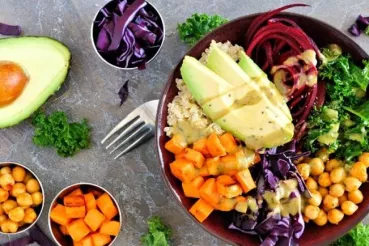When it comes to diets and diet trends, the choices can be dizzying. With so many ways to lose weight, it's hard to decipher which methods are healthy and actually work.
Lisa Ravindra, MD, an internal medicine specialist at Rush University Medical Center, takes a closer look at seven popular diet trends and how each stacks up in terms of weight loss and overall health benefits.
1. Ketogenic diet
The ketogenic diet is an extremely low-carbohydrate, high-fat diet. The goal of the diet is to maintain a state of ketosis, which means that by eating fewer carbs, the body's fat-burning system relies mainly on fat instead of sugar for energy.
This concept is actually nothing new. "There's a lot of research, going back to the early 1900s, that ketogenic diets help with certain neurologic conditions like epilepsy in children," Ravindra says. "But it's relatively a new strategy for weight loss."
Benefits
If your weight loss goals are more immediate, a ketogenic diet may be able to help you achieve those results. "It's been shown to be very effective for short-term weight loss — more so even than low-fat diets," Ravindra says.
Additional benefits may include preventing certain types of chronic disease. "There's been some suggestion that there may be benefits as far as other brain disorders such as Parkinson's disease, Alzheimer's disease, multiple sclerosis and even brain cancer," Ravindra adds. "But there have not been any definitive studies yet."
Drawbacks
Some health experts believe eating a large amount of fat and protein from animal sources can increase your risk of heart disease and certain cancers.
"On the ketogenic diet, you can, for instance, eat all the bacon you want; that obviously goes against what we've always thought would be healthy," Ravindra says. "And we don't yet know the effect of this diet on people with liver, kidney and heart disease."
The diet is also really strict. "It's an extreme diet, cutting out almost all carbohydrates," Ravindra says. That means giving up or limiting conventionally healthy foods like fruit, whole grains and some vegetables.
Very low-carbohydrate diets may also be associated with more side effects than a low-fat diet, including headaches, fatigue and bad breath.
2. Whole30 diet
The Whole30 diet is a commercial diet marketed as a "30-day nutritional reset."
During those 30 days, you are to avoid sugar, alcohol, grains, legumes and dairy. The diet does permit meat, seafood, eggs, veggies, fruit, and natural fats like vegetable oils, coconut oil and tree nuts.
Benefits
What’s nice is that the Whole30 has a built-in support system on social media. "That can be helpful for people who need to keep themselves accountable," Ravindra says. Also, there's no counting or restricting calories.
Drawbacks
The company behind the Whole30 diet claims that it can improve or "cure" many medical problems, such as asthma, depression and Lyme disease, but the claims are unfounded; there's no independent research to verify them.
"It's also really restrictive and only temporary since it lasts just 30 days," Ravindra says. Plus, it takes a lot of planning to comply.
3. Low-FODMAP diet
Some people are sensitive to certain carbohydrates that are poorly absorbed in the intestines and can cause bloating. These carbs are known as fermentable oligo, di, monosaccharides and polyols — or FODMAPs — and are found in certain grains, vegetables, fruits and dairy products.
A low-FODMAP diet is often recommended for people with irritable bowel syndrome (IBS), a common disorder that causes symptoms like cramping, abdominal pain, bloating, gas, and diarrhea and/or constipation.
Benefits
Studies demonstrate a definite improvement in IBS symptoms in people who use the low-FODMAP diet.
"I personally have had many patients with IBS who have done really well on this diet," Ravindra says. "If they follow it, they see great improvement and even go into remission."
Drawbacks
The low-FODMAP diet is not a weight loss diet. "It's really just for people with IBS," Ravindra explains. "So the studies haven't shown any benefit for people who don't have IBS."
It's also not very easy to follow because the list of low-FODMAP foods is not intuitive. "For example, broccoli is a low-FODMAP food, and cauliflower is a high-FODMAP food. So you have to have the list of foods with you at all times," Ravindra adds.
4. Intermittent fasting diet (time-restrictive eating)
Intermittent fasting is a term for an eating pattern that cycles between periods of eating very little or nothing, and eating regular meals.
Some people intermittently fast for 16 hours a day and then eat all their food in an eight-hour time span; others fast for 24 hours at a time, maybe twice a week. "This plan isn't specific about which foods to eat, but rather when you should eat them," Ravindra says.
Benefits
The intermittent fasting diet works well for people with busy schedules because it doesn't really require planning.
"There's less cooking and cleanup because you're not eating as many meals, and it helps you consume fewer calories without really thinking about what you're eating because you're simply eating less in general," Ravindra says.
Drawbacks
In a 2018 U.S. News & World Report article where 40 diets were ranked, intermittent fasting was one of the lowest on the list.
The criticism is mostly based on the fact that there's no guide on what to eat during the nonfasting days. "People could end up eating really unhealthily on those days, and there's no information on foods you're supposed to stay away from," Ravindra says.
This diet is also not recommended for people with diabetes because fasting could lead to low blood sugar that may require medication adjustment. People who have a history of eating disorders should also steer clear of this diet, and long-term compliance can be an issue as well.
Fad diets and going to extremes by cutting out major food groups — like carbs — simply aren't sustainable strategies.
5. The Mediterranean diet
A Mediterranean diet emphasizes eating fruits, vegetables, whole grains, beans, nuts, olive oil and very little red meat.
Benefits
This diet was tied for No. 1 — along with the DASH diet below — for the best overall diet in 2018 by U.S. News & World Report in large part due to its many health benefits. "Studies have shown reductions in fatal heart attacks, strokes, cancers, Parkinson's and Alzheimer's for people who follow a Mediterranean diet," Ravindra says.
Drawbacks
There are not any known health drawbacks. "I would just caution that some of the studies are short-term, and the exact reason for the health benefits is not clear," Ravindra says. Also, some of the food items can be expensive, especially compared to processed packaged foods.
6. The DASH diet
The DASH diet is designed to lower high blood pressure. The acronym in the name stands for Dietary Approaches to Stop Hypertension. It's a diet rich in fruits, vegetables, legumes and low-fat dairy products, and low in snacks, sweets, meats, and saturated and total fat.
DASH also stresses limiting salt intake. "Definitely, no more than 2,300 mg a day of salt, but ultimately you should strive to stay under 1,500 mg daily," Ravindra says.
Benefits
Tied for No. 1 alongside the Mediterranean diet in U.S. News & World Report, a low-sodium DASH diet has been proven to decrease blood pressure. It also reportedly decreases LDL ("bad") cholesterol, and possibly lowers the risk of stroke and heart disease.
"There are also lots of easily accessible DASH-based diets online, which makes it easy to comply with," Ravindra says.
Drawbacks
Although the DASH diet was not developed specifically as a weight-loss diet, it may cause some weight loss (which could also be seen as a benefit). And some people might find that limiting salt makes food taste bland.
"The good news is that there are plenty of other healthy options for flavoring, like herbs, spices and citrus juices," Ravindra says.
7. The MIND diet
The MIND diet, which stands for the Mediterranean-DASH Intervention for Neurodegenerative Delay, developed at Rush University Medical Center, combines foods from the Mediterranean and DASH diets. It focuses on 10 food groups that support brain health, including leafy greens, berries, poultry, beans and nuts.
Benefits
"The diet has been shown to benefit brain health and protect against dementia," Ravindra says.
In fact, the MIND diet can help lower the risk of Alzheimer's disease by as much as 53 percent in people who adhere to the diet rigorously, and by about 35 percent in those who follow it moderately well.
It may also help substantially slow cognitive decline in stroke survivors, according to preliminary research presented at the American Stroke Association's International Stroke Conference 2018.
Those are big reasons why MIND has been ranked No. 5 in U.S. News & World Report's list of best diets for three consecutive years.
Drawbacks
There aren't any health risks with MIND, but like the Mediterranean diet, the food needed to follow the diet can be costly.
To diet or not to diet
Fad diets and going to extremes by cutting out major food groups — like carbs — simply aren't sustainable strategies.
For long-term weight maintenance and overall health, Ravindra instead suggests the following sensible approaches to a healthy diet:
- Choose whole foods, such as whole grains, fruits and vegetables.
- Eat fewer processed or packaged foods, like hot dogs, chips or artificial sweeteners.
- Spend more time in the produce section of the grocery store rather than the packaged food aisles.
- Get more fiber, since the American diet is generally sorely lacking in fiber.
- Avoid foods with unrecognizable and unpronounceable words on the list of ingredients.
Diets are not one-size-fits-all, so what works for one person may not work for another. It's best to figure out your individual weight loss goals and nutrition priorities by talking with your primary care doctor or a registered dietitian.
And focus on making other lifestyle changes for yourself and your family, including getting plenty of sleep, exercising regularly and managing stress. "All of those things will help not only with maintaining a healthy weight," Ravindra says, "but with your overall health and well-being."




